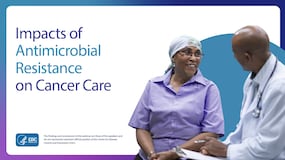Key points
- People receiving cancer treatment are at higher risk for infections and the growing global public health threat of antimicrobial resistance can make infections harder - if not impossible – to treat.
- During the April 2024 AMR Exchange webinar, panelists discussed the impacts of antimicrobial resistance on cancer care and the importance of infection prevention and control efforts to limit cancer patient exposure to antimicrobial-resistant pathogens.
- Experts suggested specific, achievable solutions and measurable outcomes to combat antimicrobial resistance.
- Watch the recording of this AMR Exchange webinar to learn more about how CDC and its partners discussed the impacts of antimicrobial resistance on cancer care.

Experts discuss how antimicrobial resistance is an obstacle to cancer care
In the eighth installment of CDC's AMR Exchange webinar series, experts discussed the intersection of antimicrobial resistance and cancer care and the importance of preventing infections in people receiving treatment for cancer.
Josh Glasser, Assistant Director for Combatting Antimicrobial Resistance and Integrated Health Innovation at the White House Office of Science and Technology Policy, discussed fighting cancer as a U.S. Government priority. Glasser elaborated on the Biden Cancer Moonshot initiative, a national effort to prevent cancer deaths and improve the experiences of people impacted by cancer. Glasser called on experts working across health care, academia, government, and non-governmental agencies to increase efforts around infection prevention and control, preserving the effectiveness of antibiotics, and applying unique scientific approaches to address cancer care and antimicrobial resistance.
Lillian Sung, Professor, Senior Scientist, and the Chief Clinical Data Scientist at The Hospital for Sick Children, highlighted the importance of creating clinical guidelines rooted in evidence-based medicine. Sung explained this is an important step for optimizing supportive care for children and further maximizing quality of life and survival of her patients. She also discussed how reducing unnecessary antibiotic therapy can help save lives. Sung shared how many of her patients have died from antimicrobial-resistant infections, further highlighting the importance of preventing the spread of antimicrobial resistance.
Shalini Jayasekar Zürn, Senior Advocacy Manager at the Union for International Cancer Control (UICC), discussed UICC's global efforts to address cancer care and antimicrobial resistance. Zürn emphasized that increased access to resources, public awareness, and knowledge sharing are needed as critical approaches to address this global issue. She provided information on UICC's AMR Control Supplement, a tool that provides the cancer community with helpful information about antimicrobial resistance. Zürn highlighted several strategies and approaches to address the global health inequities surrounding both antimicrobial resistance and cancer care outcomes including:
- Inclusion of antimicrobial resistance in national cancer control plans.
- Increased data collection and surveillance.
- Ensuring antibiotic stewardship is implemented as part of clinical practice guidelines.
Diane Flayhart, Director for Global Public Health and Antimicrobial Resistance at BD, emphasized the importance of having programs and data in place on antimicrobial resistance and cancer that help drive actions that protect patients. Flayhart emphasized increasing awareness, appropriate use of existing antibiotics, and enhanced diagnostic capacity as critical tools for preventing the spread of antimicrobial resistance and improving cancer care. She also discussed BD's Cancer and Antimicrobial Resistance Consortium, an international effort focused on bringing new data to light about the connection between antimicrobial resistance and cancer. Expanding access to current diagnostics, current antimicrobials, and innovative solutions are also critically important to address these issues, she explained.
Jennifer Wargo, Professor at the University of Texas MD Anderson Cancer Center, focused on the microbiome—the naturally occurring germs living in and on our bodies—and explained how understanding the microbiome and how it changes can help improve outcomes in cancer care. Wargo provided information on her research looking at how improving antibiotic use and maintaining the microbiome can help cancer patients receiving immunotherapy. She noted that antibiotic stewardship, particularly in patients undergoing immunotherapy, can benefit from thoughtful guidelines and approaches to tackle this issue. Long-term policies, such as promoting better nutrition, designing strategies to modulate gut microbes, and other policy initiatives and strategies can also help address cancer and related issues.
Mini Kamboj, an Infectious Disease Physician and Chief Medical Epidemiologist at Memorial Sloan Kettering Cancer Center, discussed infection prevention and control amongst cancer patients and others who are immunocompromised. Kamboj provided practical prevention strategies for infection prevention and control, such as identifying patients colonized with bacteria (such as methicillin-resistant Staphylococcus aureus) and implementing decolonization efforts. Kamboj acknowledged there are innovation gaps needed for infection prevention in cancer patients and emphasized it is critical that evidence for effective interventions come directly from the population being impacted to see reduction in these issues.
To conclude the webinar, the panelists shared final thoughts on what actions they think stakeholders could take to address the challenges of antimicrobial resistance in cancer care. These included:
- Raising awareness among the public, policymakers, patients, and healthcare providers of the impact of antimicrobial resistance on cancer care, both domestically and globally.
- Improving appropriate use and prescribing of antibiotics through diagnostic and antibiotic stewardship.
- Using data and innovation to keep up with advances in antimicrobial resistance and cancer treatment to improve health-related outcomes.
- Implementing broad policies and developmental frameworks rooted in scientific-based evidence and action plans.
Watch the recording of this AMR Exchange webinar to learn more about how CDC and its partners discussed the impacts of antimicrobial resistance on cancer care and the importance of infection prevention and control efforts to limit cancer patient exposure to antimicrobial-resistant pathogens.
Resources
- Watch previous AMR Exchange webinars
- Preventing Infections in Cancer Patients
- Controlling antimicrobial resistance in health care
- Antibiotic stewardship
- Project Firstline Infection Control and Prevention Training Materials
